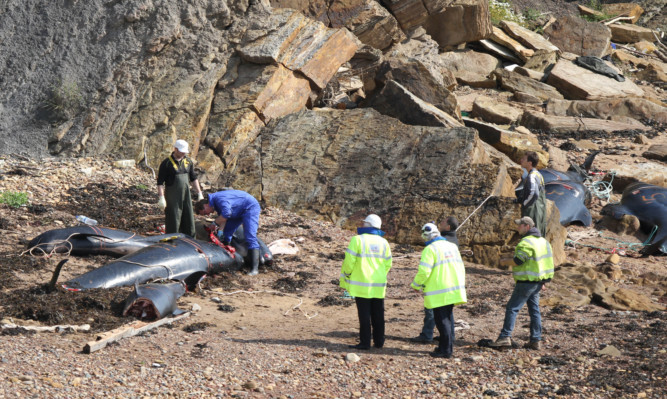A pod of whales stranded in Fife more than three years ago had high concentrations of toxic chemicals in their system, some of which had reached the mammals’ brains, scientists have found.
The long-finned pilot whales became stranded on a beach between Anstruther and Pittenweem in September 2012.
Of the 31 mammals which beached, only 10 could be refloated. Twenty-one – 16 females and five males – died.
Scientists at the University of Aberdeen, working with the Scottish Marine Animal Stranding Scheme, carried out tests on various tissue samples and have now reported their findings.
They found high levels of toxic metals mercury and cadmium in all organs, including the brain.
The mercury in some was at levels high enough to cause severe neurological damage in humans, the university said.
The study also demonstrated for the first time that cadmium can pass the “blood-brain barrier”, scientists claimed. The semi-permeable barrier can prevent some materials from entering the brain.
The report also shows a “clear correlation” between the increased toxin levels and the age of the animals, suggesting that toxic stress increases for them the longer they live.
Experts said they could not entirely discount the possibility the chemicals were a factor in the whales navigating off course.
Dr Eva Krupp, an environmental analytical chemist from the university, said: “We were able to gather an unprecedented number of tissue samples from all the major organs including the brain and as a result we can see for the first time the long-term effects of mammalian exposure to the environmental pollutants.
“This pod of whales provides unique new insights because we were able to look at the effects on a large number of whales from the same pod and how this varied according to age.”
The whales ranged in age from under one year to 36-years-old.
Scientists said they found very high concentrations of mercury in the brain of all the whales older than nine.
In three, the concentration was said to be higher than levels at which severe neurological damage would occur in humans.
“We can see clear evidence that mercury is being transported through the bloodstream to all organs where it accumulates over the lifespan,” Dr Krupp added.
She said the findings were “significant” because they demonstrate for the first time that cadmium was in the brain tissue and that those levels also increase with age.
Previous scientific studies have shown that mercury concentrations in the oceans have risen since the industrial revolution and may in turn lead to an increase of mercury levels in marine mammals.
“So far, we have no indication that the mercury and cadmium levels in the brain cause disorientation, which in some cases can lead to strandings, but there is a potential for higher stress in these iconic animals due to rising toxic metal concentration in the oceans,” Dr Krupp said.
The study has been published in the journal Science of the Total Environment.
